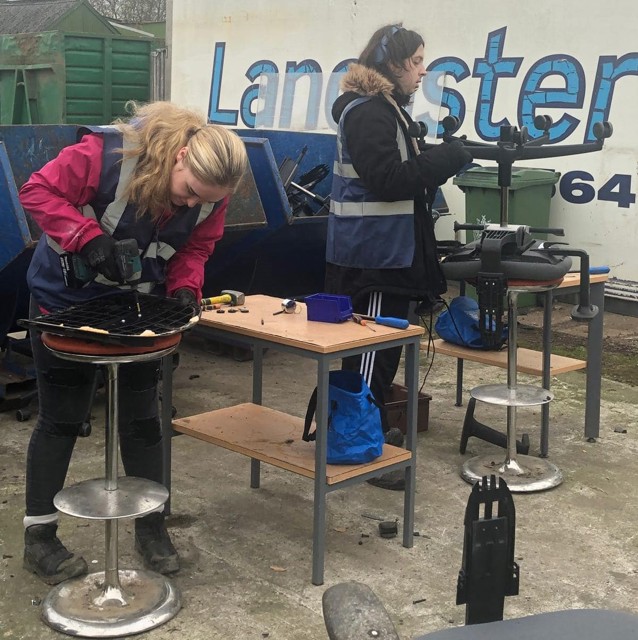
Myerscough foundation learners thriving on Supported Internships
Published: Monday 11 November 2024The latest Myerscough College foundation learning students have begun work as part of a scheme aimed at getting young people who need extra help to move into employment.

Supported Internships can have a huge impact, not only on the life outcomes of the interns who take part, but on the host organisation and wider society too.
Since Myerscough foundation learning students returned following half term, it’s been a busy time, with a number of students starting their placement with local employers across Garstang and the surrounding areas, including Save the Children, Sue Ryder, and Coggins Sustainable Office Solutions
Students go on a weekly placement to build on their employability skills and prepare them for future employment or work experience.
Supported Internships are work-based study programme where students with an EHCP (Educational Health Care Plan), and between ages of 16-25 are gaining the employability skills they need to be work ready. Myerscough supports students to kickstart their career by exploring different job opportunities, guest speakers, whilst student immerse themselves in our bespoke career programme as well as tailored support and work placements.
Internships normally last for one year and they include a work placement. Students complete a personalised Study Programme working towards a qualification, usually ‘Employability Skills’. Maths and English are also delivered as an important element.
A number of Myerscough’s current group of foundation learners are undertaking a supported internship programme, working at a number of local businesses, all significantly benefiting and improving their life skills and employment prospects.

The busy schedule is aimed at getting the group used to the routine that is expected when being in employment. The learners are supported by staff, who help them get used to the routine expected when in employment, instructing and supporting them to build skills in the workplace to complete work tasks to a high level.
At the end of the programme the interns stand a real chance of gaining employment. Their employability skills are significantly enhanced from when they started. Their work colleagues and supervisors also have the opportunity to experience the value first hand of employing a young person with special or additional needs.
A vital part of the programme is about removing misconceptions regarding young people with learning difficulties with employers. Many in the workplace are surprised what a positive contribution these young people make. It’s about creating work-ready young people and removing any barriers that may be present in the workplace that could stop the employer from taking on such a young person.

Just six percent of young people with learning difficulties are in employment, and the aim of the scheme is to help them transition from education into the world of work, so they can live more independently and don’t become socially isolated.
For more details about the scheme, available at our Preston, Blackburn and Liverpool centres, CLICK HERE
If you have a business or work for an organisation within close proximity to our centres or the Lancashire area please contact us if you are interested in supporting a student on placement in the future.
Only 4.8% of people in England (and 4.1% of people in Scotland) with a learning disability and/or autism who are known to local authorities go on to secure paid employment, compared to 80% of their peers.
FAQs
What’s a supported internship?
A work-based study programme for 16 to 24-year-olds with SEND, who have an education, health and care (EHC) plan.
The core aim of a supported internship study programme is a substantial work placement, facilitated by the support of an expert job coach.
How do they work?
Supported interns are enrolled and supported by a learning provider, for example, a school or college, but spend most of their learning time in a workplace.
Supported interns are in full-time education, and their supported internship work placement are part of their course. There is no legal requirement or expectation that the supported intern will be paid.
What are the benefits of offering a supported internship?
They have a transformative effect on the interns who take part. They offer real work experience combined with training in employability and independent living skills delivered in a business setting to help young people make successful transitions to productive adult life.
They also offer several economic benefits to the employers, providing access to a new, diverse talent stream with skills to match labour needs.
MythBusters
Myth: People with a learning disability are less productive than those without disabilities.
Fact: Research shows that people with a disability (including a learning disability) perform as well as, or better than, other employees.
Myth: People with a learning disability are more likely to be absent from work
Fact: A comprehensive study showed that people with a learning disability take less sick leave, are more punctual and stay longer in the job.
Myth: People with a learning disability do not have the skills to work.
Fact: Research shows that if anything prejudice and lack of opportunity prevent people with a disability from using their skills.
Myth: It is more expensive to recruit people with a learning disability
Fact: Even when there is an extra cost in recruitment, lower job turnover and absences offset them.
